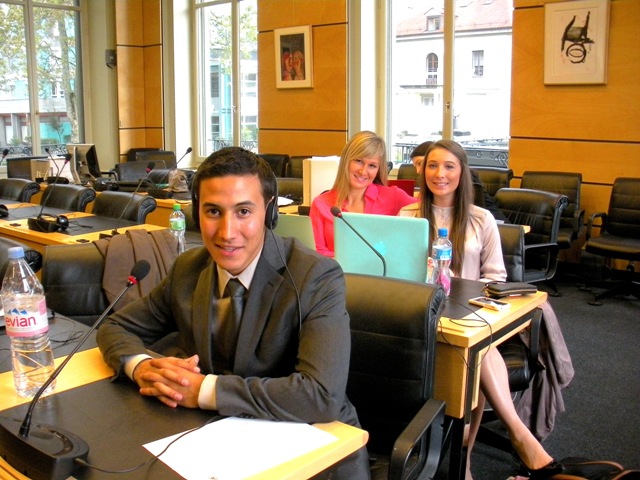Santa Clara Law’s work against human trafficking continues to be recognized nationally and internationally. The law school’s International Human Rights Clinic (“Clinic”) is proud to announce that the United Nation’s Human Rights Committee recently adopted the concerns and recommendations the Clinic submitted last semester regarding U.S. anti-human trafficking obligations under the International Covenant on Civil and Political Rights.
As noted in a previous blog post, Clinic students Carlin Lozinsky, Jessica Mawrence, and Joseph Nave travelled to Geneva with Clinic supervising attorney Britton Schwartz last fall to meet with U.N. Human Rights Committee members and discuss the Clinic’s report on how the U.S. could improve its anti-human trafficking efforts. On March 27, 2014, the Committee released its Concluding Observations, or recommendations to the United States, in which the Committee incorporated all of the points the Clinic raised during our visit to Geneva. These issues include the failure of the U.S. to identify and investigate labor trafficking, the exclusion of certain categories of workers from labor laws – thus rendering them more vulnerable to human trafficking – and the need to reinforce training of law enforcement, border and immigration officials, labor law enforcement officials, and child welfare agencies to help protect human trafficking victims. The Committee also cautioned the United States against criminalization of trafficking victims, a point raised by the CUNY International Women’s Human Rights Clinic.
The full text of the Committee’s recommendation on human trafficking strongly reflects the information provided by our Clinic last October:
While acknowledging the measures taken by the State party to address the issue of trafficking in persons and forced labour, the Committee remains concerned about cases of trafficking for purposes of labour and sexual exploitation, including of children, and criminalization of victims on prostitution-related charges. It is concerned about the insufficient identification and investigation of cases of trafficking for labour purposes and notes with concern that certain categories of workers, such as farm workers and domestic workers, are explicitly excluded from the protection of labour laws, thus rendering these categories of workers more vulnerable to trafficking. The Committee is also concerned that workers entering the U.S. under the H-2B work visa programme are also at a high risk of becoming victims of trafficking/forced labour (arts. 2, 8, 9, 14, 24, and 26 [of the ICCPR]).The State party should continue its efforts to combat trafficking in persons, inter alia by strengthening its preventive measures, increasing victim identification and systematically and vigorously investigating allegations of trafficking in persons, prosecuting and punishing those responsible and providing effective remedies to victims, including protection, rehabilitation and compensation. It should take all appropriate measures to prevent the criminalization of victims of sex trafficking, including child victims, to the extent that they have been compelled to engage in unlawful activities. The State party should review its laws and regulations to ensure full protection against forced labour for all categories of workers and ensure effective oversight of labour conditions in any temporary visa program. It should also reinforce its training activities and provide training to law enforcement and border and immigration officials, as well as to other relevant agencies such as labour law enforcement agencies and child welfare agencies.
The Committee’s inclusion of much of the information the students provided demonstrates that the Clinic’s report did indeed have an impact. For Clinic student Jessica Mawrence, this “experience was truly a form of education that is impossible to gain within the confines of a classroom, and sheds light on just one example of how invaluable participating in a Clinic can be.”

Clinic students Joseph Nave, Carlin Lozinsky, and Jessica Mawrence observing the UN Human Rights Committee in Geneva.
In addition to the exceptional work done by our students, we also thank Professors Lynette Parker and Ruth Silver-Taube, both experts on anti-human trafficking efforts in the Bay area, for their invaluable assistance in this area. Although the inclusion of our concerns in the Committee’s Concluding Observations represents an important victory for the Clinic, our work is not done; now, we will focus on advocating for implementation of the Committee’s recommendations.
Stay tuned for more updates!